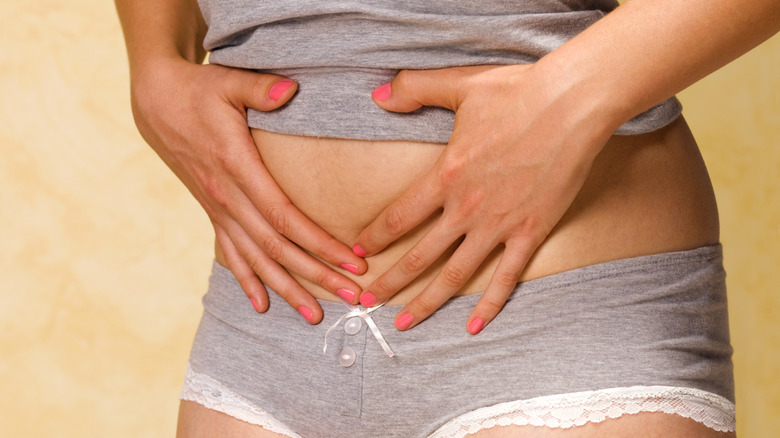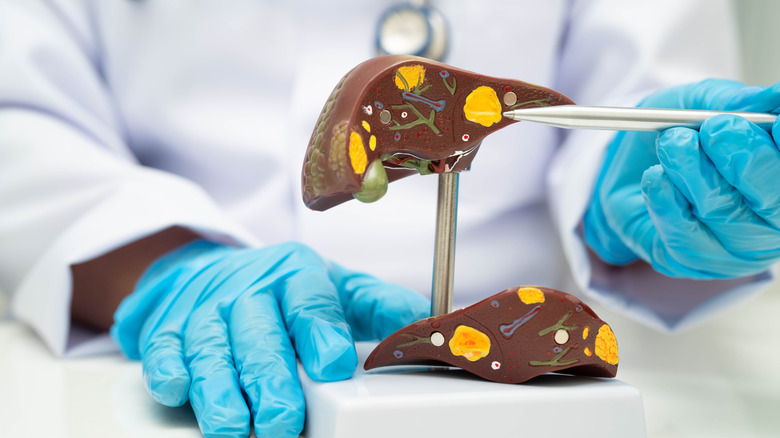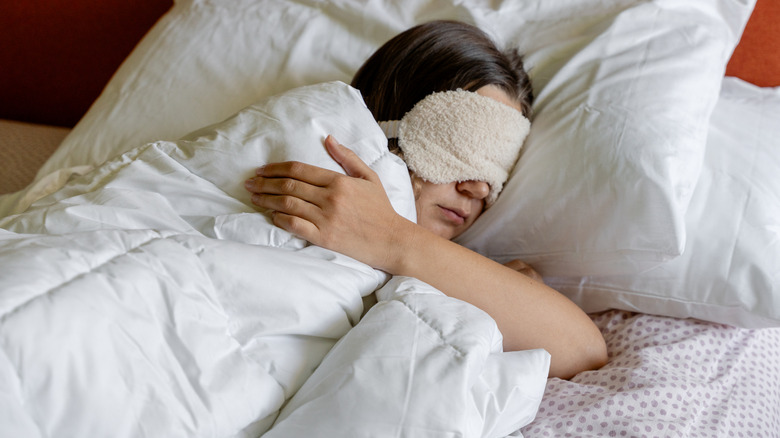Trying Dry January? Here's What Happens To Your Body When You Stop Drinking Alcohol
We may receive a commission on purchases made from links.
Drinking has become a part of many countries' cultures. If you've ever been to Seoul or Tokyo, you might have seen the drunk salarymen falling asleep on the morning train home in their suits and ties. Meanwhile, the U.S. is consuming more alcohol than countries like South Korea or Japan. In 2021, The National Institute of Health reported that the average American (older than 14) was consuming about 535.5 standard drinks per year.
Luckily, despite rising consumption numbers, Gallup reported a ten-percentage drop in adults (under the age 35) who insist they ever drink at all. It might not just be Gen Z who is becoming more mindful of their drinking habits. Every January, people of all ages around the world attempt Dry January – a challenge in which you don't consume any kind of alcohol throughout the whole month. Along with improving your finances, the benefits of cutting out alcohol range from improved skin quality and overall health. Best of all, some of these changes can happen in as little as few days.
The brain begins to go on a recovery process
There's something that happens when someone's had one too many drinks. Their speech is slurred, they're either really giddy or really sad and people even say they feel hazy. Well, that's the alcohol messing with the central nervous system. This explains the giddiness, extreme sadness, the falling and tripping, and even the inability to think clearly when people drink.
While it's true most studies have focused on the effects of chronic heavy drinking on the brain, there is proof that even temporarily the brain is affected when people have a few drinks casually. In a 2022 study, it was found that for middle-aged individuals consuming just one alcoholic drink a day was linked to changes in the sizes of gray and white matter in the brain. Not sure what gray and white matter is? (Gray matter takes up 40% of the brain and white matter takes up the rest, and gray matter conducts processes and sends messages to different parts of the body while white matter is what interprets the sensory signals different parts of the body send.) Crazy, right? The good news is that experts say when people abstain from alcohol, the brain will begin to heal and repair itself.
No more alcohol means a healthier heart
We all know the saying that a glass of wine keeps the heart healthy, but that might actually only be true for someone having a few sips. Some experts actually say that statistic might be rigged because usually people who drink red wine tend to be higher earners, which gives them access to healthier whole food options.
As cardiologist cardiologist Steven Nissen told Cleveland Clinic, "We know from lots of studies that alcohol does raise blood pressure, a little bit, not a lot" but increasing blood pressure even a "little bit" leads to an increase in "the risk of a stroke." When you cut out alcohol, your blood pressure will improve within a matter of days. Soon after, your overall triglyceride levels will decrease, and with each passing alcohol-free day, your chances of developing heart failure decreases.
You may deal with temporary bloating
The gut microbiome even plays a role for the central nervous system, with some studies that showing that an imbalance in gut microbiome can lead to various mental health issues. Experts say alcohol can also very much affect the balance of gut microbiome and take a happy gut and transform it into a whacky one. Yikes, but there is good news and it's that abstaining from alcohol can heal your gut microbiome. Ready for the bad news? It can cause some uncomfortable bloating.
Your body may bloat for a few weeks once you cut out alcohol. It might sound bad, but it's actually a positive side effect of abstaining from alcohol. According to experts, bloating is normal response to your body's attempt to rebalance hydration levels. Bloating can also happen in response to your body going through a detoxification process as it attempts to restore healthy microbiomes in the gut. The good news is this is effect is only temporary and likely to dissipate after two weeks, as long as you're drinking lots of non-alcoholic fluids and staying hydrated. Adding probiotic foods like kefir or fermented vegetables into your diet, as well as staying active can help minimize these effects, while over-the-counter gas pain medications, like Phazyme Maximum Strength Gas & Bloating Relief can alleviate discomfort.
Your liver starts to repair itself
If you've ever felt the urge to rush to the bathroom the morning after a night of drinking, it might be a sign that your liver was overwhelmed. Thankfully, the liver is a remarkable organ that is capable of healing itself, and when you stop drinking it immediately begins to repair itself. Dr. Amitava Dasgupta, author of "The Science of Drinking," told Healthline, "It doesn't happen in a day, but for anyone who drinks in excess... there are fatty changes in the liver, so when you stop drinking, those changes are reversible." Dr. Dasgupta mentioned that those who give up alcohol can expect to see positive changes "within weeks of going dry." One University College London study of 100 individuals who participated in a Dry January challenge experienced on average, 12% reduction in liver damage by the end of the month (via The Independent). Speaking about the study results to The Independent, Dr. Kevin Moore explained, "When you give up alcohol [for one month] ... there is a significant reduction in blood pressure, a significant reduction in cholesterol, [and] an improvement of glucose and insulin resistance which has a major impact on both maturity onset diabetes as well as the development of fatty liver disease."
Keep in mind those who drink excessively for an extended period time may take several months for their liver to recover. Individuals who have severe scarring on the liver may develop a condition called cirrhosis develops. Those with cirrhosis may not be able to reverse the permanent damage on their liver, but refraining from drinking can keep it from becoming worse.
Better sleep quality is on its way!
Did you know there are four stages of the sleep cycle? Stage 1 being the lightest sleep and Stage 4 being REM sleep. If you've ever woken up in the middle of the night after drinking with friends, it's likely you've experienced negative sleep quality caused by alcohol. Sleep Medicine Physician, Dr. Abhinav Singh states, "Alcohol and sleep are not friends. They do not mix well." When you sleep, you should experience all four cycles of sleep and each stage is vital in feeling refreshed when you wake up. Dr. Singh explained when an individual goes to bed with alcohol in their system, the individual is most likely going to fall right into Stage 3 sleep, also known as deep sleep. Once the body has metabolized the alcohol in your system, it's likely you'll experience the lightest stage of sleep, Stage 1 sleep. Ultimately, this will lead to waking up more frequently and overall low-quality sleep. Alcohol can also affect breathing, which can lead to snoring and is another cause of poor sleep quality.
Dr. Singh is right, alcohol and sleep do not mix well, but if you're thinking about cutting back on alcohol or abstaining from it this year, better sleep quality is on its way to you! Studies have shown abstaining from alcohol can lead to better quality sleep. People, who participated in Dry January in the past, have felt it too. The New York Times reported on a study that asked 4,000 Dry January participants in the United Kingdom about sleep quality during the month, and 56% of the participants reported that they felt they were sleeping so much better without alcohol in their system.





